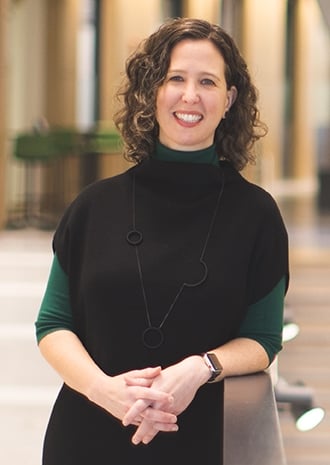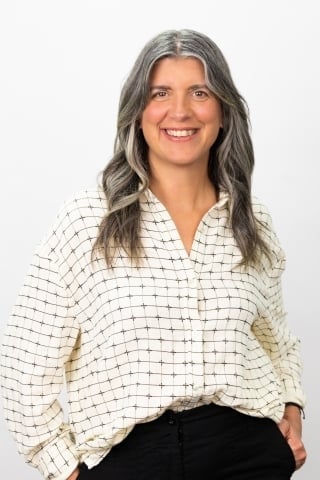You have /5 articles left.
Sign up for a free account or log in.
Dartmouth’s Thayer School of Engineering, in partnership with Coursera, recently launched a new online master of engineering in computer engineering, making this the university’s first fully online degree. While online and hybrid programs are increasingly more common, fully online degrees from highly selective institutions like Dartmouth are still few and far between. I thought this might be of interest to the broader higher education community, so I asked a colleague, Dartmouth Engineering’s dean, Alexis R. Abramson, and Coursera’s chief content officer, Marni Baker Stein, a few questions that may be on people’s minds.
Q: Universities launch online degrees all the time. Why should other institutions take notice of the online master’s degree from Dartmouth?

Alexis Abramson
Abramson: First, let me say how excited I am that Dartmouth is part of a larger transformation of higher education. This is Dartmouth’s first fully online degree, and it creates new, life-changing opportunities for more students, especially for those who face barriers to pursuing a traditional on-campus program. We are thrilled to have Coursera by our side in this effort.
Our new online master of engineering degree in computer engineering meets a very critical gap in our current world. Not only do we need more engineers, but we need engineers with skills beyond traditional STEM disciplines to help solve very complex global challenges. For instance, as technologies increasingly integrate artificial intelligence, we need engineers who can identify both the patterns in data and anomalies in human behavior.
Dartmouth’s human-centered approach to engineering means we start with consideration for human and societal impact first. Students will gain core engineering concepts in intelligent systems but also engage in interdisciplinary collaboration and hands-on learning that reflects real-world needs. Every course is thoughtfully designed to retain the distinctive elements of our on-campus program but adapted for online learning. Students receive one-on-one support from faculty, take part in asynchronous and real-time discussions with peers, and have access to numerous online and on-campus academic and career resources.
Baker Stein: It is such an honor to expand our partnership with Dartmouth and bring its first fully online degree to the world. This online degree can attract a whole new, diverse population who may never have had the chance to attend Dartmouth’s campus.

Marni Baker Stein
This degree—the first online Ivy League master’s degree in computer engineering—is coming at a critical time. We need more engineers, and with the CHIPS Act, the semiconductor industry feels that need acutely. The industry is projecting a talent shortage of 67,000 by 2030, with 26 percent of those jobs expected to be master’s-level engineers.
The online M.Eng. is job relevant. It’s flexible. And it’s accessible. The program has a lower overall cost than the on-campus program. Also, during the admissions process, students will be reviewed holistically, even considering their performance in online content, such as this C Programming with Linux [course] on Coursera. That can provide a powerful pathway for students from various backgrounds to enter a new field.
Dartmouth has brought to life a degree the world really needs right now, and I’m looking forward to seeing how students worldwide receive this program!
Q: The question I get the most from other colleagues about the new online degree is “How do you deliver a Dartmouth-quality master’s degree 100 percent online?” How will you ensure that the learning experience and educational rigor will live up to Dartmouth standards?
Abramson: We asked ourselves this very question. From the start, we knew that every engineering degree we confer—whether students earn it in Hanover or online—had to fully reflect Dartmouth’s rigor and quality. We also wanted to create a distinctive online Dartmouth Engineering experience that mirrors the supportive, collaborative, close-knit spirit in our on-campus classrooms.
For these reasons, the online curriculum is highly curated. Every course is designed for the online experience and taught by our Dartmouth Engineering faculty who teach on campus. Students will gain core engineering and technical skills, as well as “power skills” that will prepare them for leadership in a variety of fields. Students will also have regular opportunities to meet one-on-one with professors during virtual office hours. They can also access to academic support, career services and other resources virtually. We want to make sure that students in the online program feel [as] fully a part of the Dartmouth community as those studying in Hanover.
During the pandemic, we learned how to deliver a truly interactive and personal online engineering education. We learned that, yes, engineering can be both hands-on and online. The home office, kitchen counter and bathroom sink can be turned into a lab bench. Our partnership with Coursera provides us with a platform to deliver courses online in a more robust way.
Baker Stein: Education should prepare students for jobs, and that means getting students ready for today’s hybrid workforce. The latest Stanford data found that nearly half (43 percent) of Americans are either working entirely remotely or hybridly. Dartmouth has intentionally created a program that mirrors the working world. Students can watch asynchronous courses independently and then come together with faculty and staff to solve problems in real time. Online work and online learning don’t mean losing a sense of community or togetherness. It’s about optimizing how we spend that time together. We’ve even seen some online degree programs on Coursera now offer optional on-campus visits.
These live interactions complement the always-on communication tools students on Coursera can access, like Slack and discussion forums. I’m also so excited to hear from students who begin this program in March to hear more about the hands-on learning projects Dean Abramson spoke to.
Q: Dartmouth, throughout its 254 years, has been best known for its sense of place and the close-knit community and connections that this creates on its campus in Hanover, N.H. And the same goes for the Thayer School of Engineering. In the future, how do you think that traditional residential programs will co-exist with new ways of offering degree and nondegree programs?
Abramson: The future is here. We already see in-person and online components intermingling on our campus. In some cases, what we might have described as “nontraditional” a few years ago has evolved into how we just do things now. Our faculty still hold office hours in their physical offices, but many also offer to meet online to accommodate student schedules. Our graduate research labs have active Slack channels with robust online conversations. Offices post QR codes to appointment calendars on their doors so students can quickly book a meeting, even if a staff member is working remotely.
There are undeniable benefits from in-person, face-to-face interactions, and that will remain [a] strong component of a Dartmouth Engineering education. But even people who prefer the in-person experience continue to find benefit in leveraging online technologies to connect with each other.
Students face many types of restraints—be it family obligations, money, location and so on—that act as barriers to pursuing a degree at a place like Dartmouth. More and more, I believe that Dartmouth, and universities like us, will continue to find innovative opportunities to help ease those barriers and reach new student populations, better integrate the in-person and online worlds, and create stronger connections and learning experiences for all students.
Baker Stein: Dean Abramson is exactly right. The future is here, and it’s hybrid. All students, even those studying on campus, want to learn online. The latest Chloe Report found hybrid and online enrollments keep growing.
When we’re talking about fully online degrees, remember that these programs reach a whole new audience. They’re midcareer professionals, usually in their 30s and 40s, balancing the demands of full-time jobs and families. They study on their commute or do deep work once they put their kids to bed. Online degrees generally do not compete with the same students seeking on-campus programs. The residential experience will always hold great appeal for the 18- to 24-year-olds attending bachelor programs.
In the future, I predict we’ll see more universities, including the very best like Dartmouth, expanding their online catalogs. Degrees will be part of that, but so will open courses and certificates. Open degree courses allow students to experience the program and make progress toward the degree—often waiving admissions requirements or counting as credit. As a higher ed community, we need to create more accessible pathways for students of all backgrounds to access the education that can transform their lives.




